10 Common Symptoms of Migraine – as Told by Memes
Editor's Note
Any medical information included is based on a personal experience. For questions or concerns regarding health or diagnoses, please consult a doctor or medical professional.
Migraine isn’t the easiest illness to explain, because there are multiple types of migraine (chronic vestibular migraine, hemiplegic migraine, migraine with or without aura, migraine with brainstem aura, retinal migraine…) and a number of misconceptions about the condition. Well-intentioned friends and family members may offer you some over-the-counter painkillers or say, “Yeah, I have a headache, too. It sucks,” when you tell them you’re getting a migraine. It can be frustrating and lonely when those around you don’t truly understand what you’re going through.
So we rounded up some memes that may help you explain several of the symptoms you experience – and perhaps even make you laugh in the process. Because sometimes, laughing at the ridiculous symptoms so many migraine warriors experience can truly help you cope. See if you relate to the memes below, and share with your loved ones who don’t understand what it’s like to have a migraine.
1. Head Pain
There is a common misconception that a migraine is “just a bad headache.” Though this is untrue, and migraine may present with a variety of complex symptoms, head pain can certainly be a big part of it. The pain may be stabbing, burning, aching, throbbing, etc., and for many it can be debilitating.


2. Nausea/Vomiting
Nausea may often accompany a migraine, and sometimes vomiting as well. This can make it difficult to stay hydrated and keep food down for the duration of the migraine, which could last hours, days or weeks. According to Mighty contributor Lottie Anderson, migraine nausea can feel something like this:
“Imagine feeling so sick to your stomach that you can’t bear to take the vital medications you need because the vomiting that will inevitably follow will only make the pain worse, and you can’t even think about drinking that water because you know as soon as it touched your lips, you’ll throw it back up…”

3. Brain Fog
“Brain fog” is a commonly used term in the chronic illness community to describe feelings of forgetfulness, confusion and mental “fogginess” that many with health conditions experience. Difficulty thinking and concentrating can also be a symptom of migraine. “It’s like my brain has been replaced with cotton wool!” commented one Mighty reader.

4. Fatigue/Exhaustion
When someone develops a migraine, symptoms such as pain, nausea or sensitivity to light are likely enough to make them want to curl up in bed (in a dark room, of course). But the fatigue and exhaustion that may either accompany a migraine or follow in its wake (sometimes known as a “migraine hangover,” or postdrome) can be just as impactful.
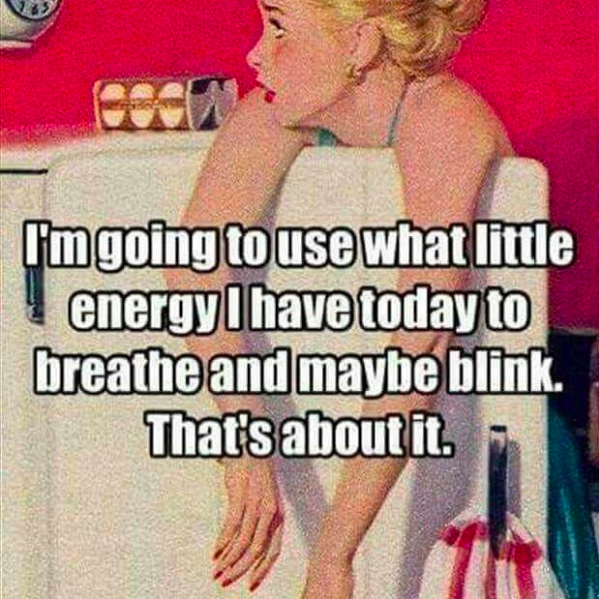
5. Sensitivity to Light
A common symptom among migraineurs is sensitivity to light. This means light can be physically painful, sickening or exacerbate other migraine symptoms. Mighty contributor Alex Tomlinson describes it as:
“Oh, lights are horrible. The sun is horrible. A screen is horrible. The flashing lights on my internet modem are horrible. Flashing lights actually are probably the worst, especially if it’s a florescent overhead light that is flickering as it’s about to go out, but the damn thing just won’t go out. Headlights are pretty bad too.
When it comes to bright lights, they’re impossible to avoid and I’ve slowly become more comfortable with just wearing my sunglasses inside without feeling like I’m being rude.”


6. Internal or External Pressure on Your Skull
In addition to the pain of a migraine, many people may feel a sensation of pressure in or around their skull. The pressure may feel like it’s coming from the outside and squeezing your head, or maybe it feels like your brain is expanding and about to explode out of your skull. Neither of these things may actually be happening, but the sensation can still be extremely uncomfortable. One Mighty reader described it as, “My head feels like it is in a vice grip, and someone just keeps tightening it slowly all day,” and another said, “It feels like your brain is too big for your skull, so it’s pushing to get out. Sometimes I swear something is pushing on my actual brain.”
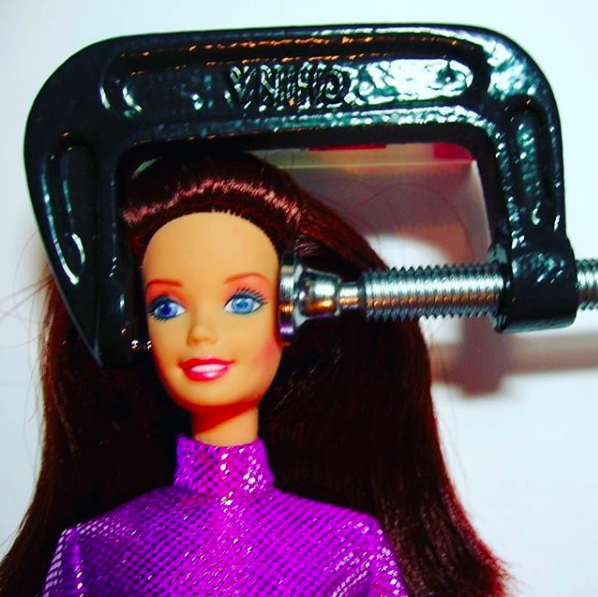
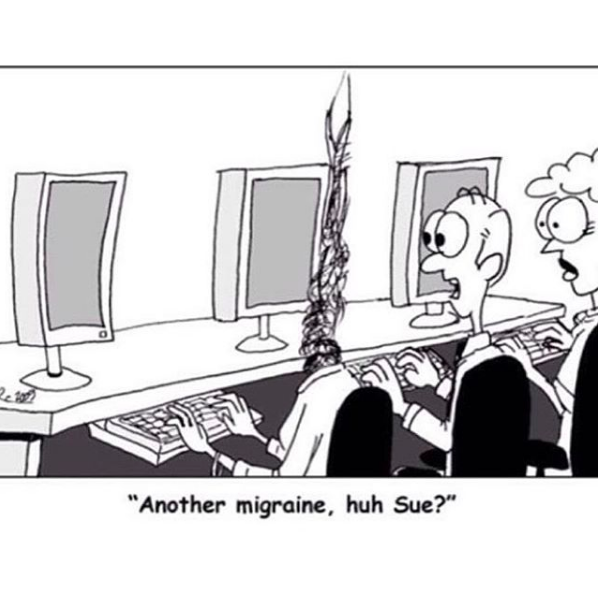
7. Aura
Some people experience a “warning sign” just before a migraine called an aura. Auras are visual, sensory, motor or verbal disturbances, though the most common type is visual. They can look different for everyone. Mighty contributor Jessica Arnold describes her visual aura like this:
“My ‘aura’ is a searing hot white spot, anywhere from dime to half dollar size, usually in the upper right quadrant of my field of vision. It is incredibly frustrating, because when I attempt to focus on it, it moves. So I end up making myself motion sick trying to ‘catch’ a better look at it. I blink. It resets back in the upper right quadrant. Involuntarily, I try to catch it again. Blink. Restart. Blink….You get the idea.”
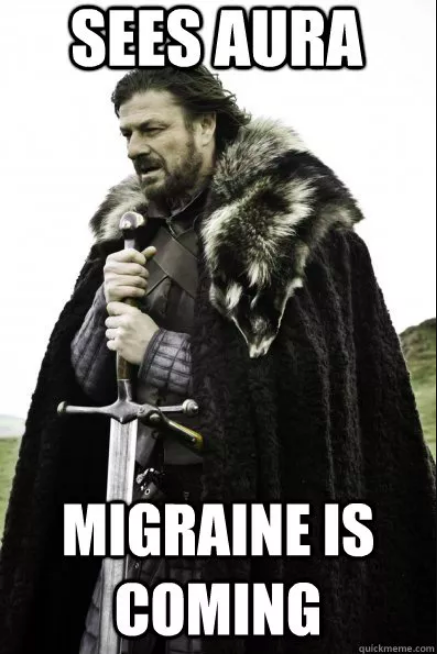
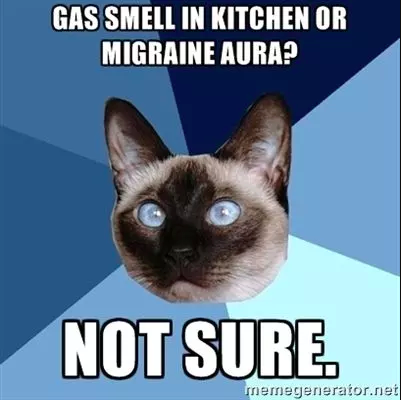
8. Vertigo
Some of those with migraine may experience symptoms of vertigo, such as dizziness, a sense of spinning or an impaired sense of balance. This migraine-associated vertigo may also be known as vestibular migraine. Mighty contributor Amanda Warman described her vertigo:
“In my opinion, this is one of the worst. Vertigo has many symptoms. It can be imbalance, dizziness, nausea, feeling like you’re spinning, rocking or falling, pressure in your ears and several other things. You can be lying down and you continue to still have this feeling. It’s without a doubt horrible. Every time I have had my ‘pass out’ issue, I have had vertigo. It’s not a fun feeling and especially because there’s nothing anyone can do for you. You have to just let it pass.”

9. Stroke-Like Symptoms
Some of those with migraine may experience symptoms that mimic a stroke. In many cases, these stroke-like symptoms are the result of hemiplegic migraine, a rare form of migraine in which people experience weakness on one side of their body. In addition to motor weakness, a person with hemiplegic migraine may also experience numbness, tingling, difficulty speaking, fever, impaired consciousness and ataxia (difficulty with muscle coordination).
Mighty contributor Mesa Fama describes her first experience with hemiplegic migraine here:
“…my body started to act as though I was walking through a cartoon. Everything had taken on a stop-motion animation feel, and I had to hold onto the walls in order to keep myself upright. I also started to feel a tingly sensation in the left side of my face.
…everything took on a dream-like quality, and the edges of my vision got a little blurry… I didn’t look good holding onto the walls to hold myself up and not being able to really form full sentences.
On the way to the emergency room, I began to lose the ability to speak, and my left side was quickly losing feeling and getting heavy. In less than 20 minutes, I was unable to speak in full sentences without becoming slightly incoherent, and I was terrified.
The ER nurses and doctors took quick action and got me into the CT scanner to see if my brain was bleeding. Luckily, it wasn’t. After a neuro consult… it was determined I was suffering from a silent hemiplegic migraine that just so happens to mimic stroke symptoms.”

10. Sensitivity to Smell
Another sensitivity that may be heightened during a migraine is that of smell. What may smell pleasant to the average person – like perfume or freshly cooked food – could trigger a migraine, or intensify the pain or nausea a migraineur is already experiencing. Mighty contributor Alex Tomlinson explained:
“I would spend every cent I earned if I didn’t have medical expenses on putting the perfume industry out of business. I’ve walked into a bathroom that some lovely lady just left and vomited on the spot because of the intense perfume smell. And perfumes, it isn’t just you. It’s scented lotions as well…
Then it boils down to the food I’d just love to consume. All the time. Some days the lovely aroma of whatever’s cooking will draw me and I’ll be dying to taste it, other days it has the same awful effect of the perfume.
It’s normal foods. It’s normal smells. But when a migraine intensifies, so do your senses, and all of a sudden a regular smell is an absolute no-no, and will, wait for it, probably make you super nauseous.”


